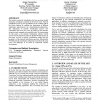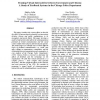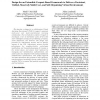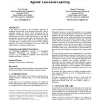405 search results - page 32 / 81 » Self-supportive virtual communities |
SIGCOMM
2009
ACM
14 years 2 months ago
2009
ACM
The interest in network virtualization has been growing steadily among the networking community in the last few years. Network virtualization opens up new possibilities for the ev...
ISM
2006
IEEE
13 years 7 months ago
2006
IEEE
Cooperative knowledge spaces create new potentials for the experimental fields in natural sciences and engineering because they enhance the accessibility of experimental setups th...
HICSS
2002
IEEE
14 years 17 days ago
2002
IEEE
This paper considers the current efforts to describe the effect of Internet-based technology on interactivity between citizens and public organizations to be incomplete and poorly...
C5
2004
IEEE
13 years 11 months ago
2004
IEEE
We describe a design for a collaborative Virtual Learning Environment (VLE) to support massively multi-user and multi-institutional learning communities. This architecture extends...
ATAL
2006
Springer
13 years 11 months ago
2006
Springer
In this paper, we propose a new integration approach for simulation and behaviour in the learning context that is able to coherently manage the shared virtual environment for the ...




